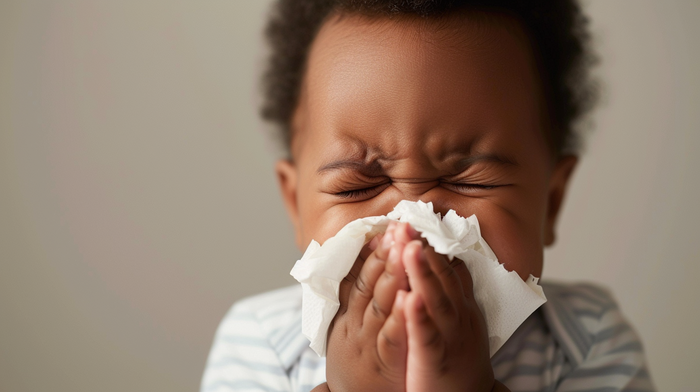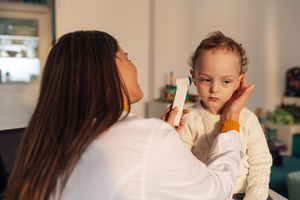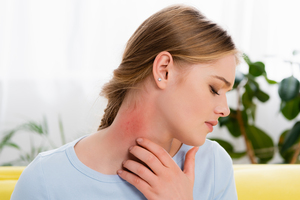Key points
- Allergies in babies are common and can be caused by food, insect stings, medications, and environmental factors.
- Symptoms of allergies in babies range from mild reactions like itchiness and runny nose, to severe reactions like anaphylaxis.
- Allergies can be classified into various types including respiratory, food, insect sting, drug, contact allergies, and others.
- Preventing allergic reactions involves identifying and avoiding known allergens, carrying prescribed medications, and ensuring that caregivers are aware of the allergy.
- Prevention of future allergic reactions involves identifying and avoiding allergens, carrying prescribed medications, and ensuring those around the child are aware of the allergy and how to respond in an emergency.

What Are the Symptoms of an Allergic Reaction?
While any food can potentially cause an allergy, certain foods such as cow's milk, eggs, peanuts, tree nuts, soy, wheat, fish, and shellfish are known to be common allergens in young children. Early identification and management of allergies are key to preventing serious health complications and improving the quality of life for both the baby and the family, according to WebMD.
For young children, symptoms of allergic reactions include the following:
Mild Reaction
Allergic reactions are the body's response to what it perceives as a harmful substance, according to the Cleveland Clinic. They note that mild reactions can typically be managed with over-the-counter medications or antihistamines. However, it is important to monitor these symptoms closely, as they can sometimes progress to more severe reactions.
-
Nasal symptoms like itchiness, runny nose, and sneezing
-
Itchy sensations in the mouth
-
Skin symptoms like hives, redness, and itching
-
Mild digestive symptoms like stomach upset or nausea
Severe Reaction
Anaphylaxis is a severe allergic reaction that is a serious medical emergency, according to the Mayo Clinic. Symptoms of anaphylaxis can develop quickly and are life-threatening. They include:
-
Swelling of the mouth or tongue
-
Difficulty swallowing or speaking
-
Wheezing or difficulty breathing
-
Nausea, vomiting or diarrhea
-
Dizziness or loss of consciousness
The Mayo Clinic notes that if someone is experiencing these symptoms, it's critical to administer epinephrine if available and call emergency services right away
Types of Allergies
Allergies can be classified into various types based on the triggers and the body's response, according to the Mayo Clinic. They list some of the common types of allergies for babies as the following:
-
Respiratory Allergies: These allergies are triggered by airborne substances. Common examples include hay fever (allergic rhinitis), which can cause sneezing, congestion, and itchy eyes, and asthma, which affects the lungs and can cause wheezing and breathing difficulties. Respiratory allergies may be mistaken for cold symptoms, according to Healthline, so it is important to see a pediatrician if you’re unsure. Respiratory allergies that are caused by environmental factors are known as Hay Fever, according to the Mayo Clinic.
-
Food Allergies: These occur when the immune system reacts to certain foods. Common food allergens include peanuts, tree nuts, shellfish, milk, eggs, wheat, and soy. Symptoms can range from mild to severe and include gastrointestinal distress, skin reactions, and anaphylaxis.
-
Insect Sting Allergies: These reactions are triggered by the venom of stinging insects like bees, wasps, and hornets. Symptoms can include swelling at the site of the sting, hives, and in severe cases, anaphylaxis.
-
Drug Allergies: Some individuals may have allergic reactions to medications, both prescription and over-the-counter. Penicillin and other antibiotics are common culprits. Symptoms may include rashes, hives, and in severe cases, anaphylaxis.
-
Contact Allergies: These occur when the skin comes into contact with an allergen, leading to contact dermatitis. Common triggers include latex, nickel, and poison ivy. Symptoms include red, itchy, and inflamed skin.
-
Papular Urticaria: This is a hypersensitivity to insect bites, causing chronic or recurrent eruptions of papules and wheals. It's more common in children and often appears as clusters of itchy red bumps or blisters.
-
Eczema (Atopic Dermatitis): Eczema is a chronic skin condition characterized by dry, itchy, and inflamed skin. It is often associated with a family history of allergies or asthma and can be triggered by various factors, including environmental irritants, stress, and food allergens.
-
Hives (Urticaria): Hives are red, raised, itchy welts on the skin that can occur as a result of an allergic reaction to food, medications, or other substances. They can also
Foods That Can Trigger an Allergy Reaction
Certain foods are well-known for their potential to trigger allergic reactions in susceptible individuals, according to the Food Allergy Research and Education Institute (FARE). They note that these foods are often referred to as the "Big Eight" allergens, as they account for the majority of food allergy reactions in babies. The list includes:
-
Milk: Cow's milk is one of the most common food allergens, particularly in children.
-
Eggs: Both the whites and yolks of eggs can trigger reactions, but most people are allergic to proteins in the white.
-
Peanuts: Peanut allergies can be severe and are a common cause of anaphylaxis.
-
Tree Nuts: This category includes nuts such as almonds, walnuts, cashews, pistachios, and Brazil nuts.
-
Soy: Soybeans are a common allergen, often found in processed foods and infant formulas.
-
Wheat: Wheat allergies are often confused with celiac disease, but they are not the same. Wheat allergy is an immune response to any of the proteins present in wheat.
-
Fish: Allergies to fish can often be severe and lifelong. People allergic to one type of fish are often advised to avoid all types.
-
Shellfish: This group includes crustaceans and mollusks such as shrimp, crab, lobster, squid, and clams.
In addition to the Big Eight, FAME notes that other foods can sometimes cause allergic reactions, including seeds (like sesame, sunflower, and poppy), certain fruits and vegetables, spices, and additives like sulfites. It's important to note that any food has the potential to cause an allergic reaction, and the specific allergens can vary greatly between individuals. If a food allergy is suspected, it is advisable to consult with a healthcare provider or an allergist for proper testing and diagnosis.
What to Do in Case of an Allergic Reaction
For mild allergic reactions in an infant, such as localized hives or itching, nasal congestion, or a mild rash, WebMD offers the following recommendations:
-
Apply moisturizer regularly to keep the skin hydrated
-
Use a fragrance-free soap or cleanser that is formulated for sensitive skin
-
Consider using scratch mitts to prevent scratching
-
Use 1% hydrocortisone cream for relief from itching and inflammation
Symptoms of severe allergic reactions, like difficulty breathing should receive emergency medical attention right away.
Prevention of future allergic reactions involves identifying and avoiding known allergens, carrying prescribed medications, and ensuring that friends, family, and caregivers are aware of the allergy and know how to respond in an emergency
Tips for Preventing an Allergic Reaction
Preventing an allergic reaction primarily involves avoiding known allergens, according to WebMD. Here are some tips to help minimize the risk of an allergic reaction in children:
-
Vacuum and dust the baby’s living space frequently to reduce allergen buildup.
-
Wash the baby’s bedding frequently, in hot water, to minimize dust mite exposure.
-
Launder the baby’s clothes with hypoallergenic detergent.
-
Opt for fragrance-free shampoo, lotions, and soap for the baby.
-
Introduce new foods to the baby's diet gradually, one at a time.
-
Check in with your child’s pediatrician about your allergy concerns and for individualized recommendations.
When to Seek Medical Help for Baby's Allergic Reaction
Some allergies can be life-threatening for a baby. According to Healthline, if the baby has a known severe allergy and you suspect they have been exposed to the allergen, even if symptoms are not yet present, you should seek emergency medical help. Additionally, you should get medical help if you notice any of the following symptoms:
-
If you observe any symptoms of anaphylaxis, such as difficulty breathing, swelling of the lips, tongue, or face, a weak pulse, pale or blue skin color, dizziness, or loss of consciousness.
-
If the baby develops a rash, hives, or eczema that does not improve with home treatment or continues to get worse.
-
If the baby has digestive symptoms like persistent vomiting or diarrhea after eating. This could indicate a food allergy, according to Healthline.
-
If the baby seems unusually fussy or irritable after eating or coming into contact with a potential allergen.
-
If the baby has mild symptoms that are not improving with over-the-counter antihistamines or if you are unsure how to manage the symptoms.
-
If the baby has had a mild reaction to a new food, remove the food from the diet and talk to your pediatrician, who may refer you to an allergist for testing and guidance on food introductions.
In all cases, it's better to err on the side of caution, according to Healthline. If you are ever in doubt about the severity of a baby's symptoms or how to handle an allergic reaction, seek medical assistance immediately. Your pediatrician can guide you in managing your child’s allergies.
For a medical emergency, like symptoms of an allergic reaction, dial 911 or visit your closest emergency room immediately.
FAQs
What are some common causes of allergies in babies?
Common causes include certain foods, insect stings, medications, and environmental factors like pollen or pet dander.
What are the symptoms of an allergic reaction in a baby?
Symptoms can range from mild reactions like itchiness and runny nose, to severe reactions like anaphylaxis, which includes symptoms like difficulty breathing and loss of consciousness.
What are the different types of allergies a baby can have?
Allergies can be classified into various types including respiratory, food, insect sting, drug, contact allergies, and others.
How can allergic reactions in babies be prevented?
Prevention involves identifying and avoiding known allergens, carrying prescribed medications, and ensuring that caregivers are aware of the allergy and know how to respond in an emergency.
When should I seek medical help for my baby's allergic reaction?
You should seek medical help if your baby has symptoms of anaphylaxis, a rash or hives that don't improve with home treatment, persistent vomiting or diarrhea after eating, or if they seem unusually fussy or irritable after eating or coming into contact with a potential allergen.











